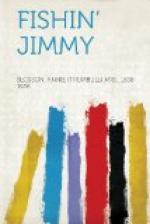Fishin’ Jimmy’s real name was James Whitcher. He was born in the Franconia Valley of northern New Hampshire, and his whole life had been passed there. He had always fished; he could not remember when or how he learned the art. From the days when, a tiny, bare-legged urchin in ragged frock, he had dropped his piece of string with its bent pin at the end into the narrow, shallow brooklet behind his father’s house, through early boyhood’s season of roaming along Gale River, wading Black Brook, rowing a leaky boat on Streeter or Mink Pond, through youth, through manhood, on and on into old age, his life had apparently been one long day’s fishing—an angler’s holiday. Had it been only that? He had not cared for books, or school, and all efforts to tie him down to study were unavailing. But he knew well the books of running brooks. No dry botanical text-book or manual could have taught him all he now knew of plants and flowers and trees.
He did not call the yellow spatterdock Nuphar advena, but he knew its large leaves of rich green, where the black bass or pickerel sheltered themselves from the summer sun, and its yellow balls on stout stems, around which his line so often twined and twisted, or in which the hook caught, not to be jerked out till the long, green, juicy stalk itself, topped with globe of greenish gold, came up from its wet bed. He knew the sedges along the bank with their nodding tassels and stiff lance-like leaves, the feathery grasses, the velvet moss upon the wet stones, the sea-green lichen on boulder or tree-trunk. There, in that corner of Echo Lake, grew the thickest patch of pipewort, with its small, round, grayish-white, mushroom-shaped tops on long, slender stems. If he had styled it Eriocaulon septangulare, would it have shown a closer knowledge of its habits than did his careful avoidance of its vicinity, his keeping line and flies at a safe distance, as he muttered to himself, “Them pesky butt’ns agin!” He knew by sight the bur-reed of mountain ponds, with its round, prickly balls strung like big beads on the stiff, erect stalks; the little water-lobelia, with tiny purple blossoms, springing from the waters of lake and pond. He knew, too, all the strange, beautiful under-water growth: bladderwort in long, feathery garlands, pellucid water-weed, quillwort in stiff little bunches with sharp-pointed leaves of olive-green,—all so seldom seen save by the angler whose hooks draw up from time to time the wet, lovely tangle. I remember the amusement with which a certain well-known botanist, who had journeyed to the mountains in search of a little plant, found many years ago near Echo Lake, but not since seen, heard me propose to consult Fishin’ Jimmy on the subject. But I was wiser than he knew. Jimmy looked at the specimen brought as an aid to identification. It was dry and flattened, and as unlike a living, growing plant as are generally the specimens from an herbarium. But it showed




